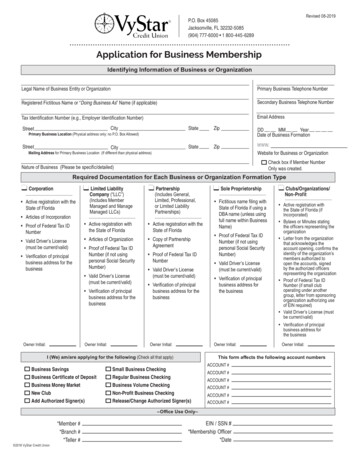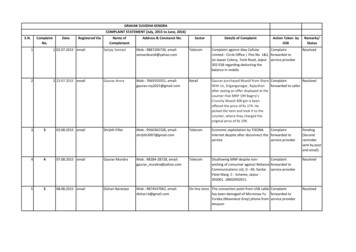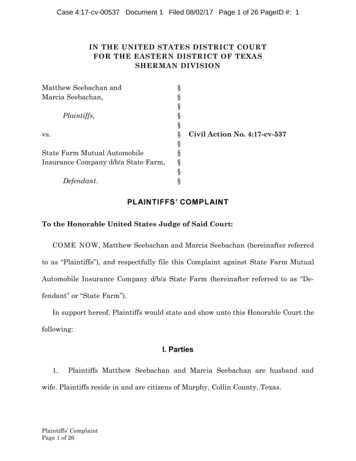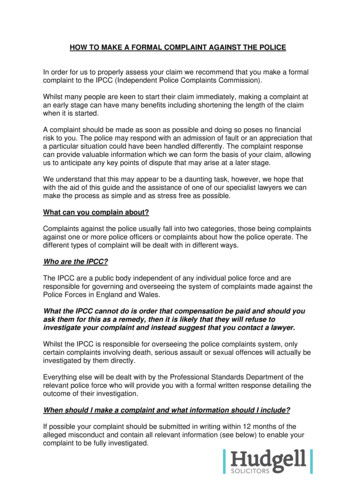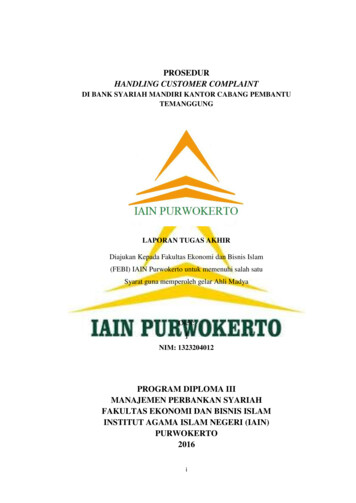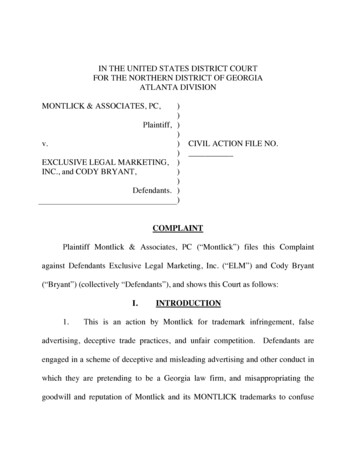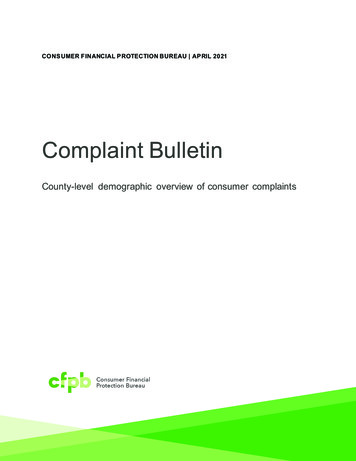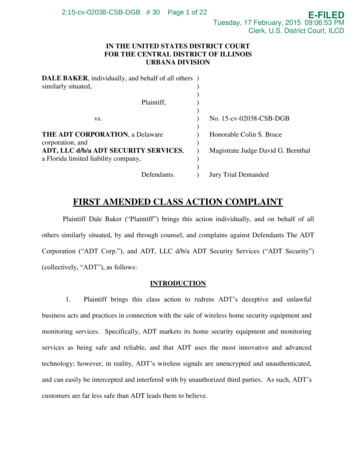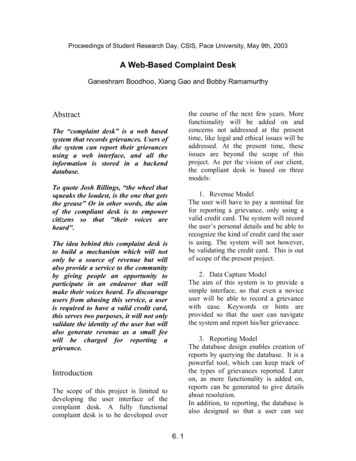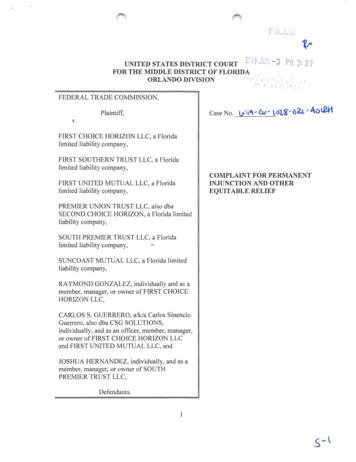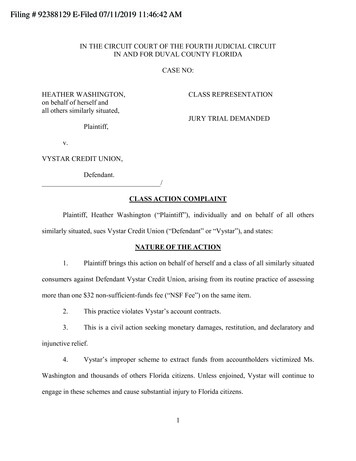
Transcription
Filing # 92388129 E-Filed 07/11/2019 11:46:42 AMIN THE CIRCUIT COURT OF THE FOURTH JUDICIAL CIRCUITIN AND FOR DUVAL COUNTY FLORIDACASE NO:HEATHER WASHINGTON,on behalf of herself andall others similarly situated,CLASS REPRESENTATIONJURY TRIAL DEMANDEDPlaintiff,v.VYSTAR CREDIT UNION,Defendant./CLASS ACTION COMPLAINTPlaintiff, Heather Washington (“Plaintiff”), individually and on behalf of all otherssimilarly situated, sues Vystar Credit Union (“Defendant” or “Vystar”), and states:NATURE OF THE ACTION1.Plaintiff brings this action on behalf of herself and a class of all similarly situatedconsumers against Defendant Vystar Credit Union, arising from its routine practice of assessingmore than one 32 non-sufficient-funds fee (“NSF Fee”) on the same item.2.This practice violates Vystar’s account contracts.3.This is a civil action seeking monetary damages, restitution, and declaratory andinjunctive relief.4.Vystar’s improper scheme to extract funds from accountholders victimized Ms.Washington and thousands of others Florida citizens. Unless enjoined, Vystar will continue toengage in these schemes and cause substantial injury to Florida citizens.1
PARTIES, JURISDICTION, AND VENUE5.Plaintiff Heather Washington is a sui juris resident of and domiciled in ColumbiaCounty, Florida, and is a citizen of the State of Florida.6.Defendant Vystar Financial Credit Union is a credit union with its principal placeof business in Jacksonville, Duval County, Florida.7.The damages in this case exceed 15,000.00, exclusive of interest, costs, andattorneys’ fees.8.The Court has personal jurisdiction over Defendant. All facts giving rise to thisaction occurred in the State of Florida. Defendant has been afforded due process because, at alltimes relevant to this matter, individually or through its agents, subsidiaries, officers orrepresentatives, Defendant engaged in and carried on a business venture in this State, maintainedan office or agency in this State, sold products in this State, or committed a statutory violationwithin this State as alleged herein. Defendant caused injuries to Plaintiff and Class members,which arose out of Defendant’s acts or omissions that occurred in the State of Florida, at whichtime Defendant was engaged in business activities in the State of Florida.9.Venue for this action is proper in this Court because Defendant is authorized totransact business in Florida, and the wrongdoing alleged herein occurred in this County, as well asin other locations where Defendant conducts business in the State of Florida.10.All conditions precedent to the maintenance of this action have been satisfied.GENERAL FACTUAL ALLEGATIONSI.Vystar Charges Two or More NSF Fees on the Same Item11.Vystar’s Membership Booklet (the “Deposit Agreement”) allows it to take certainactions when a bank accountholder attempts an Automated Clearing House (“ACH”) transaction2
but does not have sufficient funds to cover it. Specifically, Vystar may (a) authorize the transactionand charge a single 32 Overdraft Fee; or (b) reject the transaction and charge a single 32 NSFFee.12.In contrast to the Deposit Agreement, however, Vystar regularly assesses two ormore NSF Fees on the same item.13.Plaintiff does not dispute Vystar’s right to reject an item and charge a single NSFFee, but Vystar unlawfully maximizes its already profitable NSF Fees with deceptive practicesthat also violate the express terms of the Deposit Agreement.14.Specifically, Vystar unlawfully assesses multiple NSF Fees on a single ACH item.15.Unbeknownst to consumers, each time Vystar reprocesses an ACH transaction orcheck for payment after it was initially rejected for insufficient funds, Vystar chooses to treat it asa new and unique item that is subject to yet another NSF Fee. But the Deposit Agreement neverdiscloses that this counterintuitive and deceptive result could be possible and, in fact, suggests theopposite.16.The Deposit Agreement indicates that only a single NSF Fee will be charged per“item,” however many times that item is reprocessed with no request from the customer to do so.An electronic item reprocessed after an initial return for insufficient funds, especially through noaction by the customer, cannot and does not fairly become a new, unique item for fee assessmentpurposes.17.This abusive practice is not universal in the financial services industry. Indeed,major banks like Chase—the largest consumer bank in the country—do not undertake the practiceof charging more than one NSF Fee on the same item when it is reprocessed. Instead, Chasecharges one NSF Fee even if an item is reprocessed for payment multiple times.3
18.The Deposit Agreement never discloses this practice. To the contrary, it indicatesthat Vystar will only charge a single NSF Fee per item.A. Plaintiff’s Experience19.In support of her claim, Plaintiff offers an example of NSF Fees that should nothave been assessed against her checking account. As alleged below, Vystar: (a) reprocessed apreviously declined item; and (b) charged a fee upon reprocessing of that item.20.On November 20, 2018, Ms. Washington attempted an electronic payment toAT&T via an ACH transaction.21.Vystar rejected payment of that item due to insufficient funds in Ms. Washington’saccount and charged her a 32 NSF Fee for doing so. Ms. Washington does not challenge thisinitial fee as it is allowed by the Deposit Agreement.22.On November 23, 2018, unbeknownst to Ms. Washington and without her requestto Vystar to reprocess the item, Vystar processed the same item yet again, and again rejected thetransaction due to insufficient funds and charged Ms. Washington another 32 NSF Fee.23.On November 27, 2018, unbeknownst to Ms. Washington and without her requestto Vystar to reprocess the item, Vystar processed the same item yet again, and again rejected thetransaction due to insufficient funds and charged Ms. Washington a third 32 NSF Fee.24.In sum, Vystar charged Ms. Washington 96 in NSF Fees to attempt to process asingle payment.25.Ms. Washington understood the payment to be a single item as is laid out in theDeposit Agreement, capable at most of receiving a single NSF Fee (if Vystar returned it) or asingle Overdraft Fee (if Vystar paid it).B. The Imposition of Multiple NSF Fees on a Single Transaction Violates Vystar’sExpress Promises and Representations4
26.The Deposit Agreement provides the general terms of Plaintiff’s relationship withVystar and makes explicit promises and representations regarding how transactions will beprocessed, as well as when NSF Fees and Overdraft Fees may be assessed. See Ex. A at 5-6.27.The Deposit Agreement and the Membership Fees and Benefits Schedule (the “FeeSchedule”) contain explicit terms promising that NSF Fees will only be assessed once per “item,”when in fact Vystar regularly charges two or more NSF Fees per “item” even though a customeronly requested the payment or transfer once.28.According to the Fee Schedule:Deposit Services Non-sufficient Funds (NSF) 32Ex. B.29.The Deposit Agreement states:If, on any day, the available funds in your share or deposit account are notsufficient to pay the full amount of a check, draft, transaction, or other item,plus any applicable fee, that is posted to your account, we may return theitem or pay it, as described below. The Credit Union’s determination of aninsufficient available account balance may be made at any time betweenpresentation and the Credit Union’s midnight deadline with only one reviewof the account required. We do not have to notify you if your account doesnot have sufficient available funds in order to pay an item. Your accountmay be subject to a charge for each item regardless of whether we pay orreturn the item.Ex. A at 5.30.The same “items” on an account cannot conceivably become new “items” each timethey are rejected for payment then reprocessed, especially when—as here—Plaintiff took no actionto reprocess them.31.There is zero indication anywhere in the Deposit Agreement that the same “item”is eligible to incur multiple NSF Fees.5
32.Even if Vystar reprocesses an instruction for payment, it is still the same “item.”Vystar’s reprocessing is simply another attempt to effectuate an accountholder’s original requestfor payment.33.The disclosures described above never discuss a circumstance where Vystar mayassess multiple NSF Fees for a single check or item that was returned for insufficient funds andlater reprocessed one or more times and returned again.34.In sum, Vystar promises that one 32 NSF Fee will be assessed per “item,” and thatterm must mean all iterations of the same request for payment. As such, Vystar breached theDeposit Agreement when it charged more than one NSF Fee per item.35.Reasonable consumers understand any given authorization for payment to be one,singular “item” as those terms are used in the Deposit Agreement.36.Taken together, the representations and omissions identified above convey tocustomers that all submissions for payment of the same transaction will be treated as the same“item,” which Vystar will either authorize (resulting in an Overdraft Fee) or reject (resulting in anNSF Fee) when it decides there are insufficient funds in the account. Nowhere does Vystardisclose that it will treat each reprocessing of a check or ACH payment as a separate item, subjectto additional fees, nor do Vystar customers ever agree to such fee practices.37.Customers reasonably understand, based on the language of the Deposit Agreementand Fee Schedule, that Vystar’s reprocessing of checks or ACH payments are simply additionalattempts to complete the original order or instruction for payment, and as such, will not triggeradditional NSF Fees.6
38.Banks and credit unions like Vystar that employ this abusive practice know how toplainly and clearly disclose it. Indeed, other banks and credit unions that engage in this abusivepractice disclose it expressly to their accountholders—something Vystar never did.39.For example, First Citizens Bank, a major institution in the Carolinas, engages inthe same abusive practice as Vystar, but at least expressly states:Because we may charge a service fee for an NSF item each time it is presented, we maycharge you more than one service fee for any given item. All fees are charged duringevening posting. When we charge a fee for NSF items, the charge reduces the availablebalance in your account and may put your account into (or further into) overdraft.Deposit Account Agreement, First Citizen’s Bank (Sept. 2018), osit-agreement (emphasis added).40.First Hawaiian Bank engages in the same abusive practices as Vystar, but at leastcurrently discloses it in its online banking agreement, in all capital letters, as follows:YOU AGREE THAT MULTIPLE ATTEMPTS MAY BE MADE TO SUBMIT ARETURNED ITEM FOR PAYMENT AND THAT MULTIPLE FEES MAY BECHARGED TO YOU AS A RESULT OF A RETURNED ITEM ANDRESUBMISSION.Terms and Conditions of FHB Online Services, First Hawaiian Bank 40, https://www. fhb.com/en/assets/File/Home Banking/FHB Online/Terms and Conditions of FHB Online ServicesRXP1.pdf (last accessed July 1, 2019) (emphasis added).41.Klein Bank similarly states in its online banking agreement:[W]e will charge you an NSF/Overdraft Fee each time: (1) a Bill Payment (electronic orcheck) is submitted to us for payment from your Bill Payment Account when, at the timeof posting, your Bill Payment Account is overdrawn, would be overdrawn if we paid theitem (whether or not we in fact pay it) or does not have sufficient available funds; or (2)we return, reverse, or decline to pay an item for any other reason authorized by the termsand conditions governing your Bill Payment Account. We will charge an NSF/OverdraftFee as provided in this section regardless of the number of times an item is submitted orresubmitted to us for payment, and regardless of whether we pay the item or return,reverse, or decline to pay the bill payment.7
Online Access Agreement, KleinBank, /ib/disclose.html (last accessed July 1, 2019).42.First Financial Bank in Ohio, aware of the common sense meaning of “item,”clarifies the meaning of that term to its accountholders:Merchants or payees may present an item multiple times for payment if the initial orsubsequent presentment is rejected due to insufficient funds or other reason(representment). Each presentment is considered an item and will be charged accordingly.Special Handling/Electronic Banking Disclosures of Charges, First Financial Bank 2 (Aug.2018), ncial-bank/eBanking Disclosure ofCharges.pdf.43.Vystar provides no such disclosures, and in so doing, deceives its accountholders.C. The Imposition of Multiple NSF Fees on a Single Transaction Breaches Vystar’sDuty of Good Faith and Fair Dealing44.Parties to a contract are required not only to adhere to the express conditions in thecontract, but also to act in good faith when they are invested with a discretionary power over theother party. In such circumstances, the party with discretion is required to exercise that power anddiscretion in good faith. This creates an implied promise to act in accordance with the parties’reasonable expectations and means that Vystar is prohibited from exercising its discretion to enrichitself and gouge its customers.45.Indeed, Vystar has a duty to honor transaction requests in a way that is fair toPlaintiff and its other customers and is prohibited from exercising its discretion to pile on evergreater penalties on the depositor. Here—in the adhesion agreements Vystar foisted on Plaintiffand its other customers—Vystar has provided itself numerous discretionary powers affectingcustomers’ credit union accounts. But instead of exercising that discretion in good faith and8
consistent with consumers’ reasonable expectations, Vystar abuses that discretion to take moneyout of consumers’ account without their permission and contrary to their reasonable expectationsthat they will not be charged multiple fees for the same transaction.46.When Vystar charges multiple NSF Fees, it uses its discretion to define the meaningof “item” in an unreasonable way that violates common sense and reasonable consumerexpectations. Vystar uses its contractual discretion to define that term in a way that directly causesmore NSF Fees.47.In addition, Vystar exercises its discretion in its own favor—and to the prejudice ofPlaintiff and its other customers—when it reprocesses a transaction when it knows a customer’saccount lacks sufficient funds to cover the transaction, and then charges additional NSF Fees on asingle item. In doing so, Vystar abuses the power it has over customers and their bank accountsand acts contrary to their reasonable expectations under the Deposit Agreement. This is a breachof Vystar’s implied covenant to engage in fair dealing and act in good faith.48.It was bad faith and outside of Plaintiff’s reasonable expectations for Vystar to useits discretion to assess two or three NSF Fees for a single attempted payment. Vystar additionallyabuses its discretion to either pay or return an item (for the same fee) by choosing to return itmerely so that it could (in breach of the contract) assess multiple fees on the same item.49.When Vystar charges multiple NSF Fees, the bank uses its discretion to definecontract terms in an unreasonable way that violates common sense and reasonable consumerexpectations. Vystar uses its contractual discretion to set the meaning of those terms to choose ameaning that directly causes more NSF Fees.9
50.Moreover, Vystar provides itself discretion to refuse to reprocess transactions thatare initially rejected. It abuses that discretion when it repeatedly reprocesses transactions andcharges NSF Fees each time.CLASS REPRESENTATION ALLEGATIONS51.Plaintiff brings this action pursuant to Florida Rules of Civil Procedure 1.220(a)and (b)(3) on behalf of the following class:All Florida citizens that are Vystar accountholders who, during the applicablestatute of limitations, were charged more than one NSF Fee on the same item.52.Excluded from the Class are individuals who file a request for exclusion,governmental entities, Defendant, its parents, directors, officers, attorneys, and members of theirimmediate families, and the Court and persons within the third degree of relationship to the Court.53.Numerosity: The members of the Class are so numerous and geographicallydispersed that individual joinder of all members is impracticable within the meaning of Rule1.220(a)(1). However, information required to identify each member of the Class is in the controlof Defendant. While the exact number of Class members can be determined only by appropriatediscovery, Plaintiff believes that the Class includes, at minimum, thousands of members. Thedisposition of claims of Class members in a single action will provide substantial benefits to allparties and the Court.54.Commonality: Plaintiff’s claims raise questions of law and fact that are commonto all putative Class members within the meaning of Rule 1.220(a)(2). See Soper v. Tire KingdomInc., 124 So. 3d 804 (Fla. 2013). The common issues presented are as follows:A.Whether Vystar breached its own contract by charging more than one NSFFee on the same item;B.Whether Vystar breached the covenant of good faith and fair dealing;10
55.C.The proper method or methods by which to measure damages; andD.The declaratory and injunctive relief to which the Class is entitled.Typicality: As required by Rule 1.220(a)(3), Plaintiff’s claims are typical of theclaims of other members of the Class, as all such claims arise from a similar act or a series ofsimilar acts committed by Vystar. See Soper, 124 So. 3d at 804. Plaintiff is advancing the sameclaims and legal theories on behalf of herself and other members of the Class. Plaintiff is notadvancing any unique claims nor is she subject to any unique defenses.56.Adequacy: As required by Rule 1.220(a)(4), Plaintiff and her counsel will fairlyand adequately protect and represent the interests of the Class. Plaintiff is committed to thevigorous prosecution of this action and has retained competent counsel experienced in prosecutingclass actions. Plaintiff possesses no interests adverse or antagonistic to the interests of the Class.57.Predominance and Superiority: This action is properly maintained as a classaction pursuant to Rule 1.220(b)(3) because questions of law and fact common to Plaintiff’s claimsand the claims of the members of the Class predominate over questions of law and fact affectingonly individual members of the Class, such that a class action is superior to other methods for thefair and efficient adjudication of this controversy. The issues relating to Plaintiff’s claims aresimilar to the issues relating to the claims of the other members of the Class, such that a classaction provides a far more efficient vehicle to resolve the claims rather than a myriad of separateand individual lawsuits. The maintenance of this action under Rule 1.220(b)(3) is also supportedby the following considerations:A.The relatively small amount of damages that members of the Class havesuffered on an individual basis would not justify the prosecution ofseparate lawsuits; and11
B.Counsel in this class action are not aware of any other earlier litigationagainst Vystar to which any other members of the Class are a party and inwhich any question of law or fact controverted in the subject action is to beadjudicated.Count I – Breach of Contract, Including the Implied Covenant of Good Faith and FairDealing58.Ms. Washington incorporates by reference the preceding paragraphs.59.Ms. Washington and Vystar have contracted for banking services, as embodied inthe Deposit Agreement and related documentation.60.All contracts entered by Ms. Washington and the Class are identical orsubstantively identical because Vyst
that Vystar will only charge a single NSF Fee per item. A. Plaintiff’s Experience 19. In support of her claim, Plaintiff offers an example of NSF Fees that should not have been assessed against her checking account. As alleged below, Vystar: (a) reprocessed a previously declined item;
